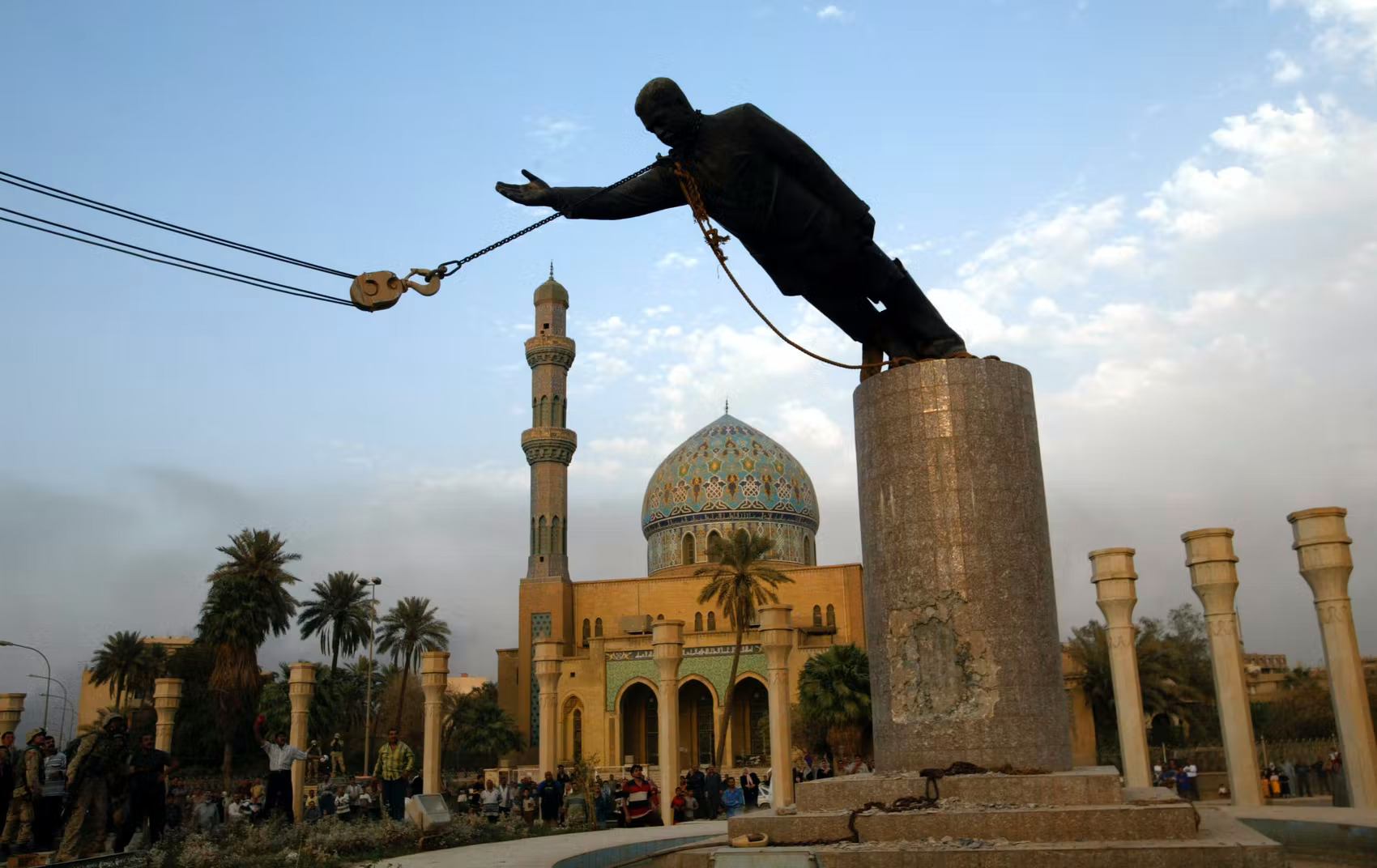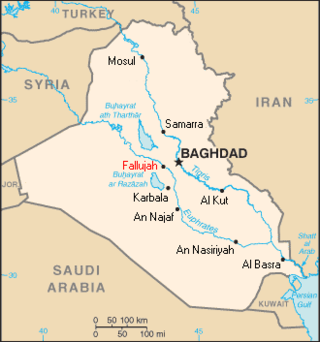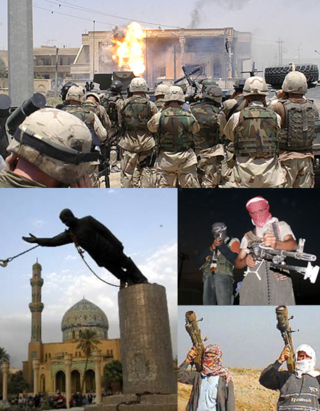
This is a timeline of the events surrounding the United States-led invasion of Iraq in 2003.

Iraq Body Count project (IBC) is a web-based effort to record civilian deaths resulting from the US-led 2003 invasion of Iraq. Included are deaths attributable to coalition and insurgent military action, sectarian violence and criminal violence, which refers to excess civilian deaths caused by criminal action resulting from the breakdown in law and order which followed the coalition invasion. As of February 2019, the IBC has recorded 183,249 – 205,785 civilian deaths. The IBC has a media-centered approach to counting and documenting the deaths. Other sources have provided differing estimates of deaths, some much higher. See Casualties of the Iraq War.

The Battle of Baghdad, also known as the Fall of Baghdad, was a military engagement that took place in Baghdad in early April 2003, as part of the invasion of Iraq.

The 2003 invasion of Iraq involved unprecedented U.S. media coverage, especially cable news networks.
William Rivers Pitt was an American author, editor, and liberal political activist.
The Yarmouk River is the largest tributary of the Jordan River.

The United States bombardment of Fallujah began in April 2003, one month after the beginning of the invasion of Iraq. In April 2003 United States forces fired on a group of demonstrators who were protesting against the US presence. US forces alleged they were fired at first, but Human Rights Watch, who visited the site of the protests, concluded that physical evidence did not corroborate US allegations and confirmed the residents' accusations that the US forces fired indiscriminately at the crowd with no provocation. 17 people were killed and 70 were wounded. In a later incident, US soldiers fired on protesters again; Fallujah's mayor, Taha Bedaiwi al-Alwani, said that two people were killed and 14 wounded. Iraqi insurgents were able to claim the city a year later, before they were ousted by a siege and two assaults by US forces. These events caused widespread destruction and a humanitarian crisis in the city and surrounding areas. As of 2004, the city was largely ruined, with 60% of buildings damaged or destroyed, and the population at 30%–50% of pre-war levels.
Ghaith Abdul-Ahad is an Iraqi journalist who began working after the U.S. invasion. Abdul-Ahad has written for The Guardian and The Washington Post and published photographs in The New York Times, The Washington Post, Los Angeles Times, The Guardian, The Times (London), and other media outlets. Besides reporting from his native Iraq, he has also reported from Somalia, Sudan, Afghanistan, Libya and Syria.
The following lists events that happened during 2006 in Iraq.

The Iraq War was a protracted armed conflict in Iraq from 2003 to 2011. It began with the invasion of Iraq by the United States-led coalition that overthrew the Ba'athist government of Saddam Hussein. The conflict continued for much of the next decade as an insurgency emerged to oppose the coalition forces and the post-invasion Iraqi government. US troops were officially withdrawn in 2011. The United States became re-involved in 2014 at the head of a new coalition, and the insurgency and many dimensions of the armed conflict are ongoing. The invasion occurred as part of the George W. Bush administration's war on terror following the September 11 attacks.

Truthout is a non-profit news organization which describes itself as "dedicated to providing independent reporting and commentary on a diverse range of social justice issues". Truthout reports news from a left-wing perspective, with its main areas of focus including mass incarceration and prison abolition advocacy, social justice, climate change, militarism, economics and labor, U.S. LGBTQIA rights and reproductive justice.
Events in the year 2007 in Iraq.

Aaron Glantz is a Peabody Award-winning radio, print and television journalist who produces public interest stories. His reporting has sparked more than a dozen Congressional hearings, a raft of federal legislation and led to criminal probes by the Drug Enforcement Administration, the FBI and the Federal Trade Commission. Because of his reporting, 500,000 fewer U.S. military veterans face long waits for disability compensation, while 100,000 fewer veterans are prescribed highly addictive narcotics by the government.

Dahr Jamail is an American journalist who was one of the few unembedded journalists to report extensively from Iraq during the 2003 invasion of Iraq. He spent eight months in Iraq, between 2003 and 2005, and presented his stories on his website, entitled "Dahr Jamail's MidEast Dispatches." Jamail has been a reporter for Truthout and has also written for Al Jazeera. He has been a frequent guest on Democracy Now!, and is the recipient of the 2008 Martha Gellhorn Prize for Journalism. In 2018, the Izzy Award of the Park Center for Independent Media was awarded to Jamail, and shared by investigative reporters Lee Fang, Sharon Lerner, and author Todd Miller.
The Martha Gellhorn Prize for Journalism, named for the war correspondent, Martha Gellhorn, was established in 1999 by the Martha Gellhorn Trust. The Trust is a UK-registered charity. The award is founded on the following principles:
The award will be for the kind of reporting that distinguished Martha: in her own words "the view from the ground". This is essentially a human story that penetrates the established version of events and illuminates an urgent issue buried by prevailing fashions of what makes news. We would expect the winner to tell an unpalatable truth, validated by powerful facts, that exposes establishment conduct and its propaganda, or "official drivel", as Martha called it. The subjects can be based in this country or abroad.

The Ministry of Health and environment of Iraq was formed in 1920.
Baghdad Medical City formerly known as Saddam Medical City (1983-2003) and before that known as Medical City Teaching Hospital (1973-1983) is a complex of several teaching hospitals in Bab Al-Moatham, Baghdad, Iraq. The complex stands where the former Garden of Ridvan of Baghdad was.

Muntadhar al-Zaidi is an Iraqi broadcast journalist who served as a correspondent for Iraqi-owned, Egyptian-based Al-Baghdadia TV. As of February 2011, al-Zaidi works with a Lebanese TV channel.

The Road to Fallujah is a 2009 American documentary film directed by Mark Manning and written by Manning and Natalie Kalustian.

Al-Mustansiriyah University is a public university located in Baghdad, Iraq. It traces its origin back to 1227. The modern form of the university was founded in 1963.













